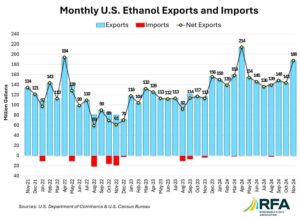 Despite many challenges, Iowa biodiesel production in 2024 totaled 353 million gallons, up from 350 in 2023 and the highest production since the record 365 million in 2018.
Despite many challenges, Iowa biodiesel production in 2024 totaled 353 million gallons, up from 350 in 2023 and the highest production since the record 365 million in 2018.
Iowa biodiesel plants managed to power through being undercut by a drastically low Renewable Fuel Standard (RFS) blending level for 2024, but could not escape uncertainty surrounding tax policy as the long-time biodiesel blenders credit expired while the rules for the new 45Z Clean Fuel Production Credit remain in flux. By the end of 2024, multiple Iowa biodiesel plants were not producing.
“Iowa biodiesel producers powered through most of 2024, but the end of the year brought a time of uncomfortable uncertainty,” said Iowa Renewable Fuels Association Executive Director Monte Shaw. “We need quick action in Washington to prevent 2025 from being worse. Multiple plants are sitting at idle waiting and hoping for the Treasury Department to finalize the rules for the new 45Z Clean Fuel Production Tax Credit. Tax credit uncertainty has tied the entire biodiesel supply chain up in knots. We need action now. Biodiesel remains a key part of ensuring domestic energy security while boosting rural communities and farmers.”
Soybean oil continues to be the main source of biodiesel in Iowa, accounting for 77 percent of the production in 2024. Animal fats made up 9 percent, while canola oil, distillers corn oil, and used cooking oil (UCO) each made up over 4 percent of feedstocks.
Iowa’s ten biodiesel plants have the capacity to produce 416 gallons annually. The IRFA compiled production information from a confidential industry survey.












